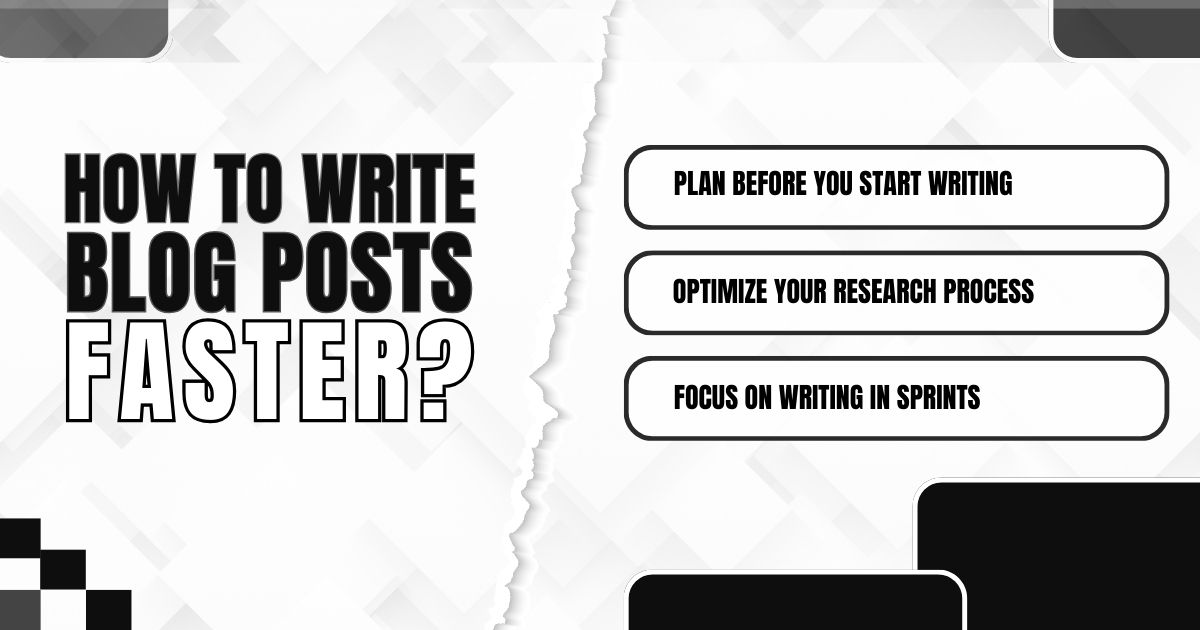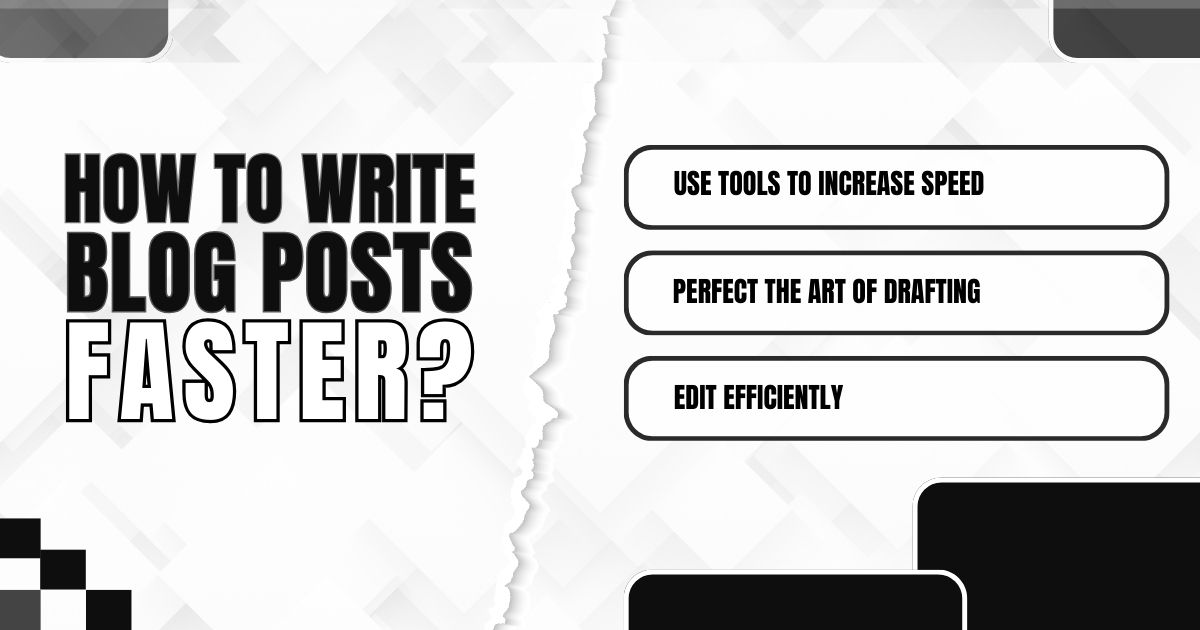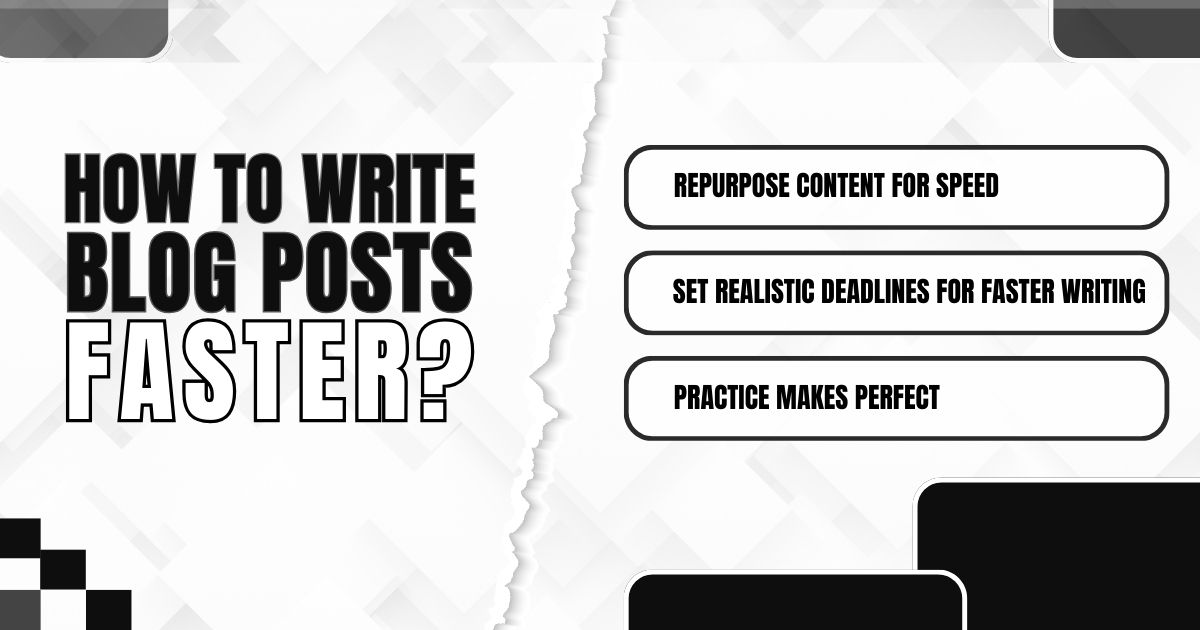Do you spend hours or even days trying to finish just one blog post? It can feel like the process drags on, holding you back from creating more content. But what if you could turn that around? By making a few simple adjustments, you could write blogs faster, without sacrificing quality.
Consistently publishing posts in less time opens up more space for fresh ideas and bigger opportunities. You could focus on expanding your blog content strategy, connecting with your audience, or even taking on more opportunities—all because you're no longer bogged down by slow writing.

1. Plan Before You Start Writing
Before you start writing a blog post, it’s important to plan well. Start by making an outline that breaks your content into clear sections like Introduction, Main Body, and Conclusion. This outline will act as your guide, helping you stay on track and avoid getting stuck. Also, think about who you are writing for and what you want to achieve—whether it’s to inform, entertain, or convince the reader. Knowing your audience and goal helps you stay focused and makes writing quicker and easier.
Another helpful tip is to set a word limit. This way, your post won't end up too short to be useful or too long to lose the reader’s interest. Having a set word count helps you keep each section balanced and avoids drifting off-topic, making your blog post more organized and easier to write.
2. Optimize Your Research Process
To blog speed up your writing, start by using any research you already have. Look through your notes or past projects that are related—this saves time instead of starting from scratch. Creating a research file is also a great idea: gather all links, quotes, and key data in one place before you write. This keeps everything organized and prevents wasting time searching while writing.
Another effective method is to batch your research tasks. Set aside specific time just for research, separate from your writing sessions. This focus allows you to gather information quickly and effectively without interrupting the writing flow, making the entire process much more efficient.
3. Focus on Writing in Sprints
Writing in sprints means setting aside short, focused periods to write without interruptions. One popular method is the Pomodoro Technique, where you work for 25 minutes straight, then take a 5-minute break. These timed sessions help maintain focus, prevent burnout, and keep the writing process more manageable.
To stay productive, turn off distractions—mute your phone, close unrelated tabs, and focus solely on writing. Don’t worry about making every sentence perfect during this time. Instead, focus on getting your thoughts down; you can refine and polish the blog content later when you edit.

4. Use Tools to Increase Speed
Using tools can greatly speed up your blog writing process. Voice typing lets you speak your ideas instead of typing them, which is much faster and often more natural. AI writing assistants can help generate ideas or even draft sections, making it easier to get past writer’s block. You can also use text expanders to create shortcuts for common phrases, saving you from typing the same thing over and over again.
These tools help you work smarter by reducing the time spent on repetitive tasks and letting you focus more on your content. With the right technology, you can write blogs faster, streamlining the entire writing process for greater blog speed and efficiency.
5. Perfect the Art of Drafting
When drafting, avoid overthinking each sentence. Just let your ideas flow naturally without worrying too much about perfect wording or grammar. This helps you get your thoughts on the page faster, making it easier to complete the first draft without unnecessary delays.
Keep your sentences simple at this stage—there's no need for fancy language. Also, know when to stop adding details. Too many specifics can slow you down and make your writing overly complicated. Focus on getting the core message across; you can refine it later during editing.
6. Edit Efficiently
Editing efficiently can be made much easier by using tools like Grammarly or Hemingway. These tools help you craft great writing blogs through catching spelling mistakes, enhancing sentence flow, and clarifying your writing. After finishing your draft, take a break for a while—this helps you come back with a fresh perspective, allowing you to spot errors and see how well the content flows.
When editing, tackle one thing at a time. Start by looking at the overall structure to make sure everything is in the right order. Then, simplify any complicated sentences. Finally, focus on fixing grammar and spelling errors. Breaking it down into these layers makes editing feel less overwhelming and ensures your content is polished.

7. Repurpose Content for Speed
Repurposing content can be a great way to speed up your writing process. Instead of starting from scratch, revisit old blog posts and update them with fresh information or new insights. This allows you to save time while still creating relevant content. Another strategy is to use templates for posts you write regularly, like listicles or guides—having a structure ready makes it quicker to fill in the details.
Additionally, simplifying the format of your posts can help. Leverage lists, FAQs, or summaries to break down complex information, making it easier to write and for readers to understand. These formats are not only quick to create but also highly engaging for your audience.
8. Set Realistic Deadlines for Faster Writing
To write blog posts faster, it's important to set realistic deadlines for yourself. Limiting the time spent on each post creates a sense of urgency, helping you stay focused and avoid getting lost in unnecessary details. Scheduling blog topics in advance also prevents last-minute pressure, making it easier to manage your workload.
Another way to improve your speed is by tracking how long each step takes, such as research, drafting, and editing. Keeping a record of your time helps identify where you might be slowing down, allowing you to optimize your process for future posts.
9. Practice Makes Perfect
To get better and faster at writing blog posts, it's important to make writing a daily habit. Just like any skill, the more often you practice, the easier it becomes. Writing every day helps you become more familiar with organizing your ideas, which naturally speeds up the process over time.
Another key part of improving is figuring out what slows you down. Pay attention to which steps take the longest—maybe it's the research, drafting, or editing. Once you identify these bottlenecks, you can focus on making those parts more efficient. Lastly, getting quick feedback from peers can help you spot areas for improvement and adjust faster, ultimately saving time in future writing projects.
Write Blog Faster Without Sacrificing Quality
Writing blog posts faster doesn’t mean sacrificing quality—it’s about working smarter. Implementing the 9 actionable steps outlined above will help you stay consistent with your blogging and unlock more opportunities to grow your content strategy. Refine your process continuously, and soon those lengthy writing sessions will be a thing of the past.
Need to write faster and smarter? SwissKnifeAI lets you generate responses from three AI models in one go, offering diverse insights to streamline tasks like content creation and research. Its user-friendly interface simplifies drafting, editing, and brainstorming, saving you valuable time. With easy query input and response consolidation, you'll create better content faster. Try it today!
FAQs
Why does it take so long to write a blog post?
The time it takes to write a blog varies depending on several factors, like your typing speed, the amount of research needed, and how familiar you are with the subject. For example, if you’re an average blogger who writes about 500 words per hour, it might take around 2 hours to complete a 1,000-word blog. However, this time can be reduced if you're able to quickly write down ideas or if you're highly knowledgeable about the topic.
How long should it take to write a 1000-word blog?
Writing a 1000-word article can take anywhere from 2 to 4 hours, depending on factors like how familiar the writer is with the topic, how fast they type, and how much research is required. For articles between 1000 and 1500 words, the time might extend to 2 to 6 hours. However, the time can vary depending on how quickly the writer can quickly write down ideas and the complexity of the content.
How many blog posts should I write per day?
Longer, in-depth articles (around 1000-2000 words) tend to perform better because they offer more value and keep readers engaged. If you're just starting, aim to publish 5-10 blog posts a week or at least 1-2 posts daily. Ensure each post is optimized for SEO to help boost your blog's ranking on search engines.
What is the best time to publish a blog post?
Blog traffic tends to peak at specific times during the day. The highest traffic typically occurs around 11 a.m., just before lunchtime. Mornings, between 7 a.m. and 9 a.m., also see significant activity as people check blogs before starting their workday. Another traffic spike happens at 12 p.m. to 2 p.m. during lunch breaks. Finally, between 4 p.m. and 6 p.m., as people finish work, there is one last surge before traffic starts to decline. Understanding these patterns can help optimize your blog post timing.


Leave a comment